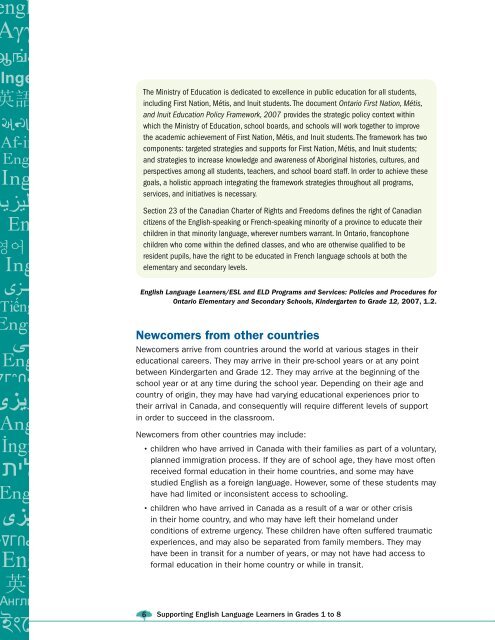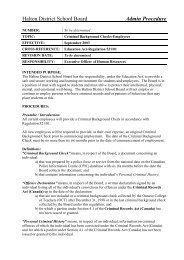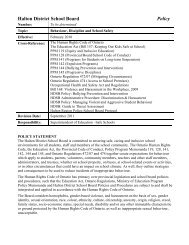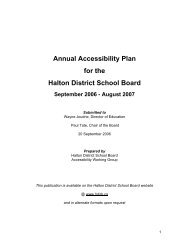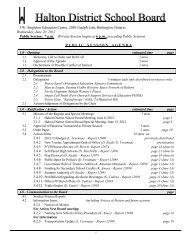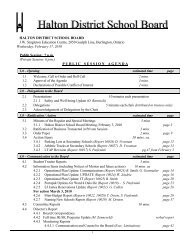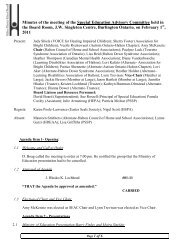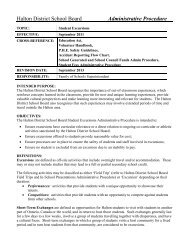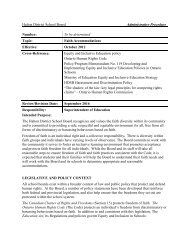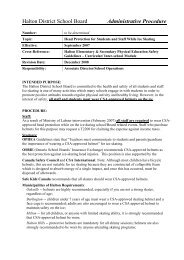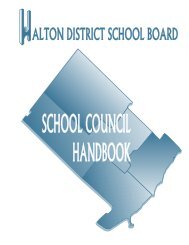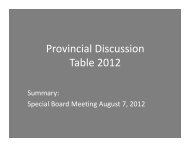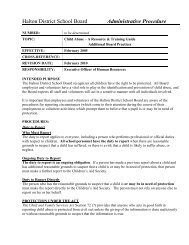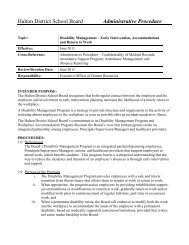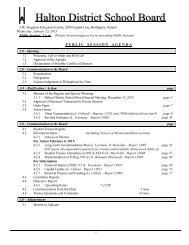Supporting English Language Learners in Grades 1 to 8
Supporting English Language Learners in Grades 1 to 8
Supporting English Language Learners in Grades 1 to 8
You also want an ePaper? Increase the reach of your titles
YUMPU automatically turns print PDFs into web optimized ePapers that Google loves.
The M<strong>in</strong>istry of Education is dedicated <strong>to</strong> excellence <strong>in</strong> public education for all students,<br />
<strong>in</strong>clud<strong>in</strong>g First Nation, Métis, and Inuit students. The document Ontario First Nation, Métis,<br />
and Inuit Education Policy Framework, 2007 provides the strategic policy context with<strong>in</strong><br />
which the M<strong>in</strong>istry of Education, school boards, and schools will work <strong>to</strong>gether <strong>to</strong> improve<br />
the academic achievement of First Nation, Métis, and Inuit students. The framework has two<br />
components: targeted strategies and supports for First Nation, Métis, and Inuit students;<br />
and strategies <strong>to</strong> <strong>in</strong>crease knowledge and awareness of Aborig<strong>in</strong>al his<strong>to</strong>ries, cultures, and<br />
perspectives among all students, teachers, and school board staff. In order <strong>to</strong> achieve these<br />
goals, a holistic approach <strong>in</strong>tegrat<strong>in</strong>g the framework strategies throughout all programs,<br />
services, and <strong>in</strong>itiatives is necessary.<br />
Section 23 of the Canadian Charter of Rights and Freedoms def<strong>in</strong>es the right of Canadian<br />
citizens of the <strong>English</strong>-speak<strong>in</strong>g or French-speak<strong>in</strong>g m<strong>in</strong>ority of a prov<strong>in</strong>ce <strong>to</strong> educate their<br />
children <strong>in</strong> that m<strong>in</strong>ority language, wherever numbers warrant. In Ontario, francophone<br />
children who come with<strong>in</strong> the def<strong>in</strong>ed classes, and who are otherwise qualified <strong>to</strong> be<br />
resident pupils, have the right <strong>to</strong> be educated <strong>in</strong> French language schools at both the<br />
elementary and secondary levels.<br />
<strong>English</strong> <strong>Language</strong> <strong>Learners</strong>/ESL and ELD Programs and Services: Policies and Procedures for<br />
Ontario Elementary and Secondary Schools, K<strong>in</strong>dergarten <strong>to</strong> Grade 12, 2007, 1.2.<br />
Newcomers from other countries<br />
Newcomers arrive from countries around the world at various stages <strong>in</strong> their<br />
educational careers. They may arrive <strong>in</strong> their pre-school years or at any po<strong>in</strong>t<br />
between K<strong>in</strong>dergarten and Grade 12. They may arrive at the beg<strong>in</strong>n<strong>in</strong>g of the<br />
school year or at any time dur<strong>in</strong>g the school year. Depend<strong>in</strong>g on their age and<br />
country of orig<strong>in</strong>, they may have had vary<strong>in</strong>g educational experiences prior <strong>to</strong><br />
their arrival <strong>in</strong> Canada, and consequently will require different levels of support<br />
<strong>in</strong> order <strong>to</strong> succeed <strong>in</strong> the classroom.<br />
Newcomers from other countries may <strong>in</strong>clude:<br />
••<br />
children who have arrived <strong>in</strong> Canada with their families as part of a voluntary,<br />
planned immigration process. If they are of school age, they have most often<br />
received formal education <strong>in</strong> their home countries, and some may have<br />
studied <strong>English</strong> as a foreign language. However, some of these students may<br />
have had limited or <strong>in</strong>consistent access <strong>to</strong> school<strong>in</strong>g.<br />
••<br />
children who have arrived <strong>in</strong> Canada as a result of a war or other crisis<br />
<strong>in</strong> their home country, and who may have left their homeland under<br />
conditions of extreme urgency. These children have often suffered traumatic<br />
experiences, and may also be separated from family members. They may<br />
have been <strong>in</strong> transit for a number of years, or may not have had access <strong>to</strong><br />
formal education <strong>in</strong> their home country or while <strong>in</strong> transit.<br />
6 <strong>Support<strong>in</strong>g</strong> <strong>English</strong> <strong>Language</strong> <strong>Learners</strong> <strong>in</strong> <strong>Grades</strong> 1 <strong>to</strong> 8


